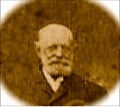
PREV ARTICLE
NEXT ARTICLE
FULL ISSUE
PREV FULL ISSUE
WILLIAM POILLON (1844-1918)
John Lupia submitted the following information from the online draft of his book of numismatic biographies for this week's installment of his series. Thanks! As always, this is an excerpt with the full article and bibliography available online. This week's subject is
New York collector and ANS officer William Poillon.
-Editor
He was born the eldest of seven children of a Dutch family on August 1, 1844, in New York City, son of Cornelius Corson Poillon (1815-1881) and Julia Mariann Corbet (1821-). He married Clara Wilson (1851-1892), and they had three children : William Clark Poillon (1872-1947), Harry Cornelius Poillon (1874-1950), and Julia Aline Poillon (1877-). His family lineage extends back to 17th century New York beginning with Jacques Poillon (1675-1733), a Huguenot, who was born in Flatbush, Long Island, New York. The family owned large real estate holding in Brooklyn and other locations in New York and they also owned one of the largest shipyards in New York and engaged in shipbuilding. He served as a Corporal in the Fourth “D” Company, Seventh Regiment, National Guard, State of New York. In 1867, he purchased the Salamander Works, Rahway Avenue, Woodbridge, New Jersey, a clay manufactory established circa 1825. In 1871, he incorporated the pottery. The early pottery production was limited entirely to artware. In 1890, his teenage son Harry Cornelius Poillon, became the President of the Salamander Works. In 1896, a devastating fire destroyed the factory. Five years later, his daughters-in-law revived the factory in 1901. Being a descendant of an Early American Colonial family led him to pursue active involvement with study and collecting interests of that period of history. As a result we find that on November 25, 1874 he was elected a Life Member of the New York Genealogical and Biographical Society, and produced six genealogical and biographical pamphlets for them. He was also a member of the St. Nicholas Society, organized to study and conserve the history of New York's Dutch ancestry, since membership is by invitation only exclusively to persons whose families lived in New York prior to 1785. In the same way he became a member also of Holland Society, The Huguenot Society, and Society of Colonial Wars, for which he published articles. After the death of his wife Clara in 1892 and his term as ANS Vice-President he moved to Chicago embarking on a business venture, which caused him severe losses and bankruptcy. He returned to New York “a broken man” struggling through his remaining years. He died while an incumbent member of the ANS Council at his residence 301 West 106th Street, New York City, on April 12, 1918. Numismatic Career : He was involved in five auction sales of his coins, library and collectibles during his lifetime. His estate held six additional sales posthumously. He collected medals associated with the American Revolution and Masonry. His interest in medals brought him into friendship with Charles De Kay, who presented him with a copy of his 1910 book, A Brief Word on Medals. He was an ANS Life member since November 11, 1869. He was very active in the ANS and served as the Secretary 1878-1885; Vice-President 1886-1893; Historiographer 1897-1900; Curator 1906-1909. In 1875, he was a subscriber to Sylvester Sage Crosby, The Early Coins of America. In 1876, E. J. Attinelli credits him in the Preface to Numisgraphics, calling him William Poillon, Jr., probably in jest to his rather large stature. He was a donor, in 1878, to the ANS library. He also established one of the ANS Permanent Funds. From 1879 to 1880 he assisted William T. R. Marvin in the production of The Medals of the Masonic Fraternity Described and Illustrated. In 1908, he produced for the ANS, Catalogue of the Collection of Gold Coins in the Cabinet of the American Numismatic Society. He became a corresponding member of the Western Pennsylvania Numismatic Society in 1880. He applied to the ANA in July 1902 and is member no. 422. He is in a photograph taken at the ANA Montreal Convention in 1909 illustrated here in the above Fig. 1. His unbridled enthusiasm for collecting Masonic medals made him easy prey and victim to many dealers who profited from his naïve credence and numismatic ignorance in this specialized area since no guidebook or reliable reference was available to him.
To read the complete article, see:
THE BOOK BAZARREWayne Homren, Editor The Numismatic Bibliomania Society is a non-profit organization promoting numismatic literature. See our web site at coinbooks.org. To submit items for publication in The E-Sylum, write to the Editor at this address: whomren@gmail.com To subscribe go to: https://my.binhost.com/lists/listinfo/esylum All Rights Reserved. NBS Home Page Contact the NBS webmaster 
|
